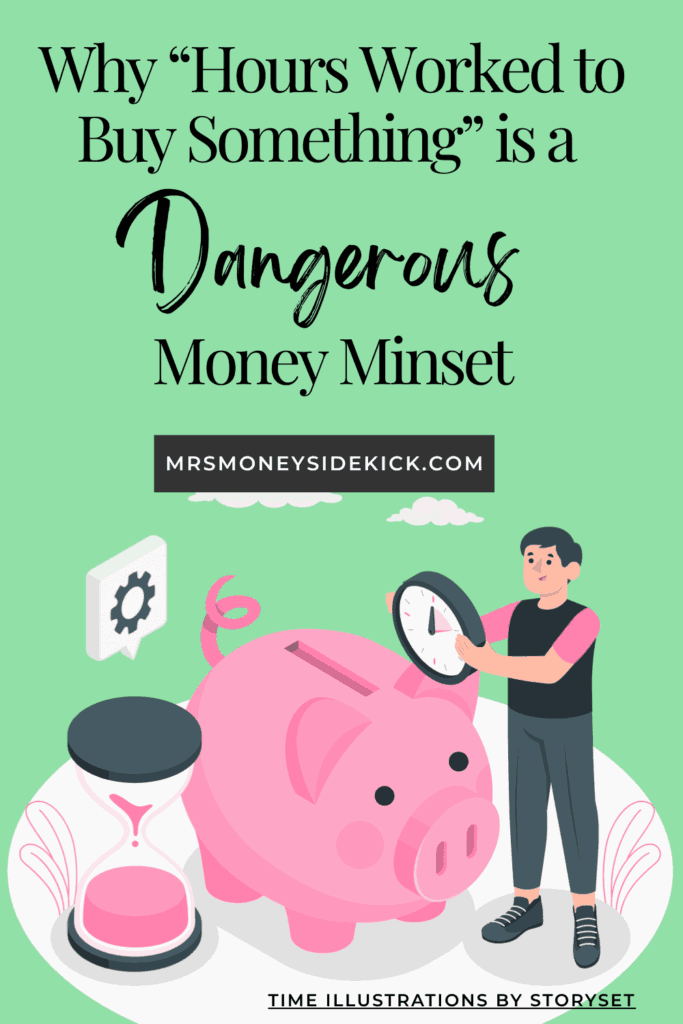Why “Hours Worked to Buy Something” Is a Dangerous Money Mindset
When you’re young and earning your own paycheck, it feels like freedom. Suddenly, you can buy the things you’ve always wanted — the new game console, the TV, the trip with friends, or even the fancy coffee machine. For many people, the way they justify those choices is by thinking in terms of hours worked to buy something. If a game console costs $300 and they make $20 an hour, that’s only 15 hours of work. Easy, right?
Wrong.
That mindset is a trap. You can’t just count hours worked to buy something as if you can magically tack on extra shifts whenever you want. Your working hours are finite, your paycheck is limited, and every dollar you spend here is a dollar taken from somewhere else.
My Personal Story: The Conversation That Changed How I Saw the Value of Time vs Money
When my husband and I first moved in together (back then he was still my boyfriend), we already knew a little about each other’s spending habits. But living together made it glaringly obvious.
We were young, with steady paychecks and not too many responsibilities yet. For him, that meant freedom to spend. He and his friends were constantly buying the next video game release, booking trips to Vegas, splurging on the latest tech, or paying for conveniences. His mindset was: “Why not? It’s only X hours of work. I’d rather pay for the convenience and happiness now.”
And I hated that thought.
I told him, “You can’t just think of it as hours worked to buy something, because you can’t magically add more hours to your week. You can’t suddenly work 12 hours a day. You’re capped.”
If you’re in a salaried job, extra hours don’t mean extra pay. And if you’re hourly, your boss decides how many hours you actually get. The truth is, you don’t have infinite time to trade for wants. Even if you did, would it be worth giving up sleep, health, or time with people you love?
That was the moment I understood: the time is money mindset only works when you also recognize the limits of time.
The Hidden Flaw in Calculating Hours Worked to Buy Something
At first glance, calculating the cost of purchases in work hours feels smart. It makes the price tag more real. But in practice, it creates a false sense of affordability.
- You can’t work more than you’re allowed. Overtime isn’t guaranteed. Extra shifts aren’t always approved. Salaried employees? Forget it.
- Your time is already spoken for. Rent, utilities, food, debt, savings, they already consume most of your paycheck.
- Not all purchases are equal. A $500 weekend trip disappears in three days. A $500 emergency fund cushions you for months or years.
- Your hours are capped. You can’t just add 30 more hours to the week whenever you feel like it.
The hours worked to buy something mindset acts like your time is elastic, when really, it’s rigid and limited.
The Role of Opportunity Cost: Every Dollar Has a Job
Here’s what most people forget: when you choose to spend here, you’re choosing not to spend somewhere else. This is called opportunity cost — the hidden price of what you give up.
- Spend $500 on a game console? That’s $500 not going into your emergency savings.
- Blow $300 on the latest gadget? That’s $300 not reducing your credit card debt (and the interest you’ll keep paying).
- Drop $1,000 on a Vegas trip? That’s $1,000 not moving you closer to owning a car that could last years.
Every purchase steals from another possibility.
The question isn’t just “How many hours worked to buy something is this?” but “What am I giving up to have this?”
This is where the passion comes in: once you understand opportunity cost, you realize your money and your time are too precious to waste on things that don’t deeply matter.
Why You Can’t Just Work More to Buy Things

Here’s the blunt truth: you only get 24 hours in a day. Between work, sleep, eating, family, and simply living, the time left is tiny. You can’t endlessly stack hours just to fund more wants.
Even if you try, here’s what happens:
Earning potential stays capped. Salaried employees don’t earn more from longer days, and hourly workers can’t always get extra shifts.
Burnout sets in. Your health pays the price.
Relationships suffer. You trade connection for consumption.
So stop pretending you can “just work more” to buy things. You can’t. And deep down, you already know it. Once those hours are gone, they’re gone.
A Better Way to Decide If Something Is Worth Buying
Instead of tricking yourself with the hours worked to buy something calculation, use a stronger lens:
- What lasting value will this bring me? Is it a one-week thrill or a five-year benefit?
- Does this align with my bigger goals? Will this get me closer to financial freedom, or keep me stuck?
- What’s the opportunity cost? If I buy this, what meaningful thing will I lose out on?
When you start asking these questions, you stop buying out of impulse and start buying out of intention.
Real-Life Examples of Smarter Choices
- Phone vs Travel. A $1,000 phone may be shiny, but a $1,000 trip creates memories for a lifetime.
- Convenience vs Debt Freedom. That $200 “life hack” gadget? Cool for a week. That same $200 toward credit card debt saves you hundreds in interest.
- Impulse Buy vs Emergency Fund. A $300 impulse purchase might feel good today, but an emergency fund keeps you safe every single day.
These comparisons reveal what you really give up when you follow the “hours worked to buy something” mindset without considering opportunity cost.
Tips and Tricks to Save Money and Still Feel Happy
- Set a fun spending budget. Guilt-free, intentional, and capped.
- Chase happiness-per-dollar. More joy doesn’t always come from higher price tags.
- Buy used or refurbished. Same value, fewer hours worked to buy something.
- Leverage discounts. Cashback apps, deal trackers, and sales reduce the real cost.
- Delay gratification. Waiting 24–48 hours kills impulse buys.
- Choose experiences. They pay back in joy, connection, and memories.
Final Takeaway: Protect What’s Truly Limited
Money comes and goes. But time? Time is the one thing you can never get back.
That’s why the “hours worked to buy something” mindset is dangerous. It lulls you into thinking every purchase is affordable, when really, your hours are capped, your money has competing jobs, and the opportunity cost of your choices is massive.
The next time you’re tempted to justify a purchase with “It’s only a few hours,” stop. Ask yourself instead:
- Is this worth a slice of my limited working life?
- What will I give up if I buy this?
- Will this move me closer to the life I want, or further away?
Your time, your money, and your energy are too valuable to waste. Spend them wisely, passionately, and with purpose because once they’re gone, they’re gone.
On your side,
Mrs. Money Sidekick
P.S. Want more? Check out my other articles in the Money Essentials
Time illustrations by Storyset



